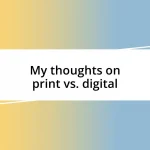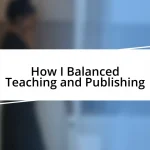Key takeaways:
- Rejection letters provide valuable feedback and insights, encouraging personal growth and skill refinement.
- Emotional responses to rejection evolve from initial shock and self-doubt to acceptance and motivation to improve.
- Using rejection as a catalyst for self-improvement fosters resilience and adaptability, transforming setbacks into opportunities for success.
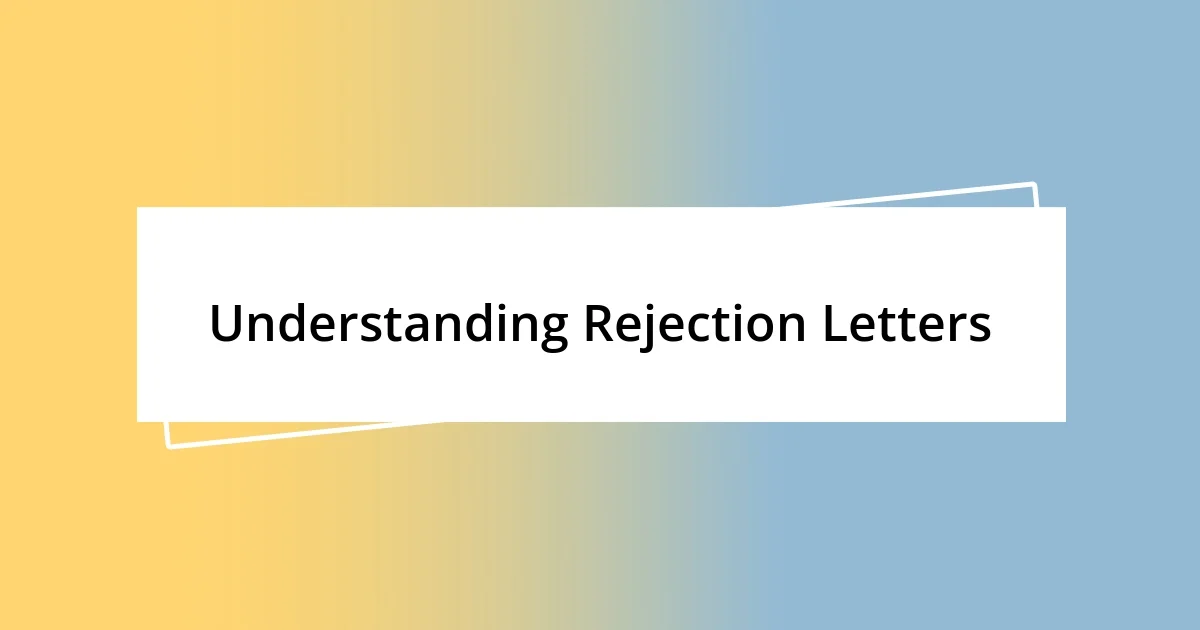
Understanding Rejection Letters
Rejection letters can feel like a punch to the gut. I remember receiving my first one; it felt less like a letter and more like a personal judgment. What I learned through that experience is that these letters usually contain valuable feedback, even if it’s hard to muster the courage to read it.
When I dissected my rejection letters, I often discovered hints about how I could improve my approach. Have you ever noticed that sometimes, these letters highlight areas in your work you hadn’t even considered? These insights often transformed my perspective and encouraged me to refine my skills.
It’s important to recognize that receiving a rejection letter is part of the journey, not the end. I like to think of them as stepping stones rather than stumbling blocks. Isn’t it comforting to realize that every successful person has faced rejection at some point? Each letter isn’t merely a closed door; it’s an opportunity to learn, adapt, and ultimately succeed.
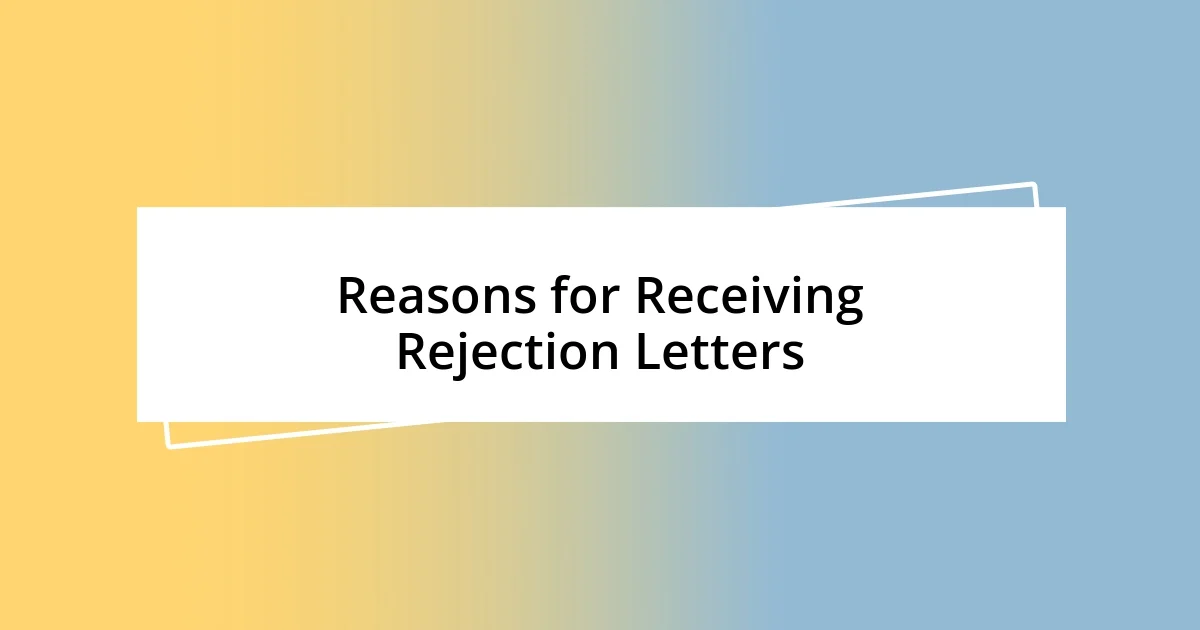
Reasons for Receiving Rejection Letters
Rejection letters often stem from a variety of reasons, many of which might have little to do with our actual skills or talents. For instance, I remember a time when I submitted a project proposal that I thought was solid, only to receive a rejection because the company was pivoting its focus elsewhere. This experience taught me that sometimes, it’s just a matter of timing and alignment with the organization’s current goals.
Here are some common reasons for receiving rejection letters:
- Mismatched Qualifications: Your skills or experiences may not align with what the employer is seeking.
- Overwhelming Competition: Often, applicants are competing against several highly qualified candidates.
- Budget Constraints: Sometimes positions are cut due to budget issues rather than lack of capability.
- Incomplete Applications: Missing documents can lead to disqualification.
- Shifting Priorities: Organizations might change their direction or needs, impacting their selection criteria.
Each rejection opened my eyes to broader contexts that I hadn’t considered before, highlighting that it’s not always about personal inadequacies but the broader landscape of opportunities.
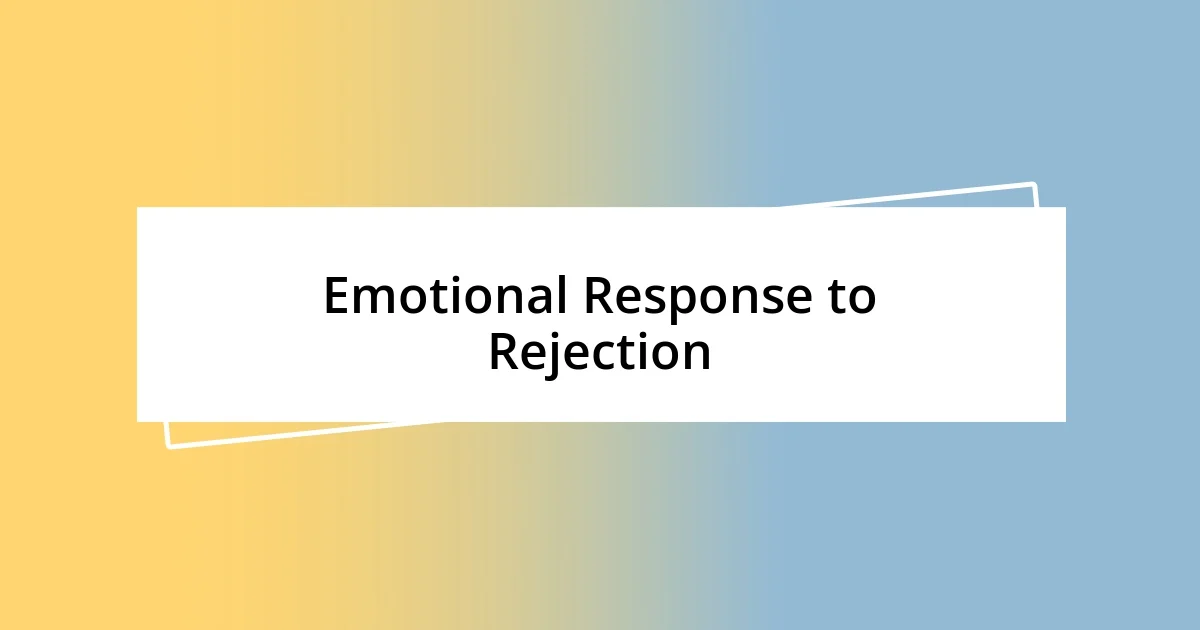
Emotional Response to Rejection
When I received my first rejection letter, it felt heavy. I remember staring at the paper as if it held all my hopes within its creases. The disappointment settled in, but it was more than just sadness—it was a mix of self-doubt and frustration bubbling underneath. Have you ever felt that sting when you just knew you put your best out there? It’s a visceral experience that shakes your confidence but also sets the stage for self-reflection.
As I navigated through rejection letters, I encountered a surprising range of emotions. At times, anger surged—how could they overlook my efforts? But then came acceptance, helping me to recognize that rejection isn’t a judgment of my worth or talent. Instead, it is a moment to pause, breathe, and reevaluate. I started to understand that the emotional turbulence was part of the process, a stepping stone to resilience.
Over time, I learned that these rejection letters could actually spark growth rather than hinder it. The emotional response shifted from devastation to determination. Each letter began to feel like a nudge toward refining my skills. It’s empowering when you realize you still have control over your journey, even in the face of rejection. Isn’t it intriguing how our perspectives can change over time?
| Emotional Response to Rejection | Common Reactions |
|---|---|
| Initial Shock | Immediate feelings of disbelief or numbness. |
| Self-Doubt | Questioning one’s abilities or worth. |
| Anger or Frustration | Feeling upset at the circumstances or decision-makers. |
| Acceptance | Realizing rejection is a natural part of the process. |
| Motivation to Improve | Using feedback to enhance skills or approaches. |
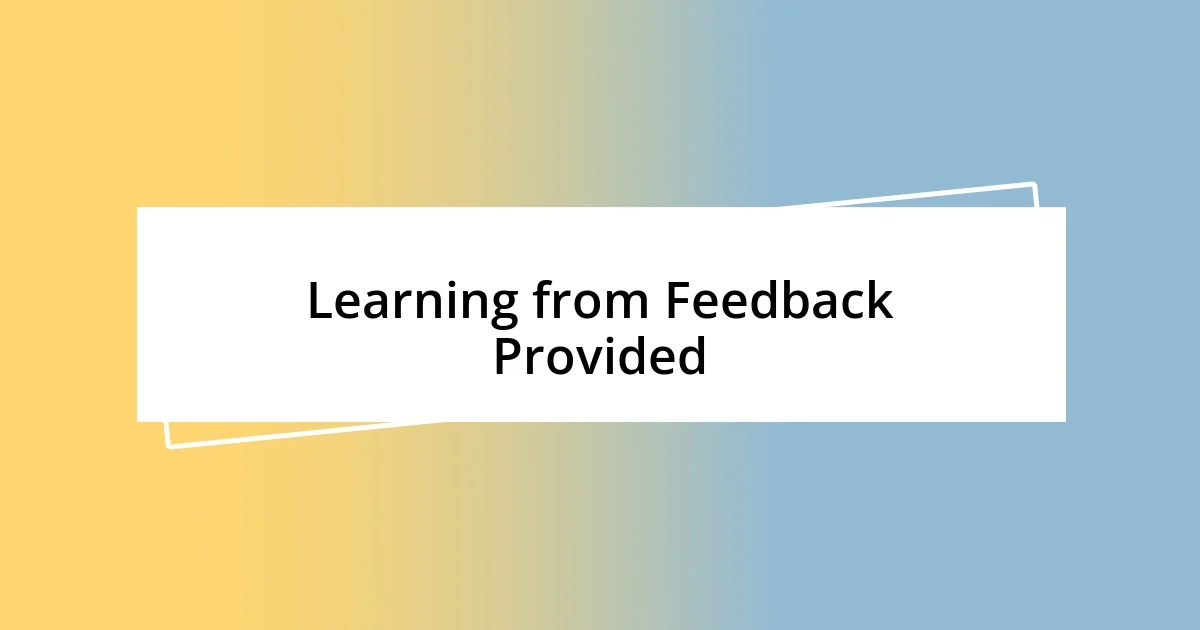
Learning from Feedback Provided
When I received feedback with my rejection letters, it was like a gentle tap on the shoulder urging me to look deeper. One time, a reviewer mentioned that my writing lacked a clear voice. At first, I felt defensive, but pondering what they said led me to explore different writing styles. Didn’t that feedback push me to grow in an unexpected way?
I’ve realized feedback doesn’t just point out flaws; it can illuminate paths for improvement. For instance, another letter highlighted that my project lacked specific metrics for success. Initially, I brushed it off, but reflecting on it, I recognized how vital those metrics are in making a case compelling. How often do we overlook the practicality in our passions?
Moreover, understanding that feedback is not a personal vendetta but rather a tool for growth has transformed my relationship with rejection. Every time I opened a rejection letter, I asked myself: What can I learn from this? Shifting my mindset made all the difference. It morphed those painful moments into valuable lessons, laying the groundwork for my future successes. Isn’t it fascinating how we can turn another’s words into stepping stones toward our goals?
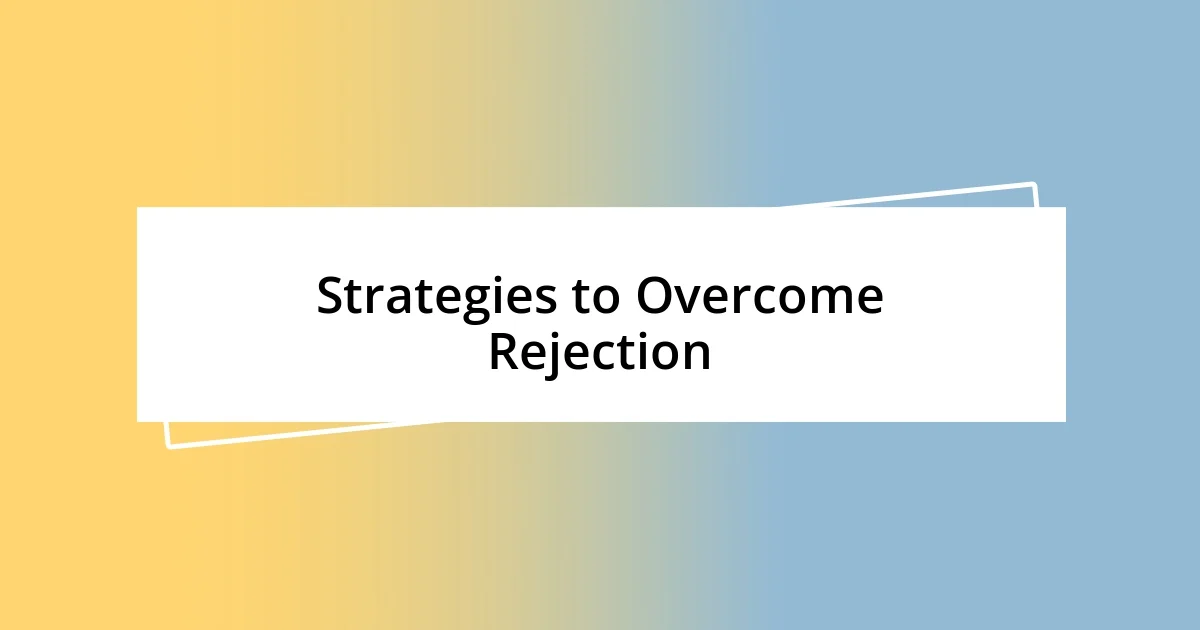
Strategies to Overcome Rejection
Finding ways to bounce back from rejection is crucial, and I’ve discovered that reframing my thoughts can make a world of difference. Instead of viewing rejection as a dead end, I chose to see it as merely a step along my journey. It’s like realizing that one raindrop doesn’t decide the forecast for the whole year—there’s so much more ahead. Have you ever felt that way? What if you allowed setbacks to guide instead of define you?
Another strategy that worked wonders for me was reaching out to my support network. Sharing my experiences with friends helped me feel less isolated. After one particularly tough rejection, a friend reminded me of all the times I had overcome challenges. It was a lovely reminder that rejection often precedes growth. I realized how valuable it is to have people who can provide encouragement when I need it most. How powerful is a supportive community in transforming our perspective?
Lastly, setting small, achievable goals became my personal antidote to the sting of rejection. I started focusing on specific projects, breaking them down into manageable tasks. After a rejection, rather than wallowing in frustration, I’d celebrate my effort and progress on the next step. I found that accomplishing these small milestones not only boosted my confidence but also sparked motivation to keep pushing forward. Isn’t it amazing how one small win can ignite a fire within us?
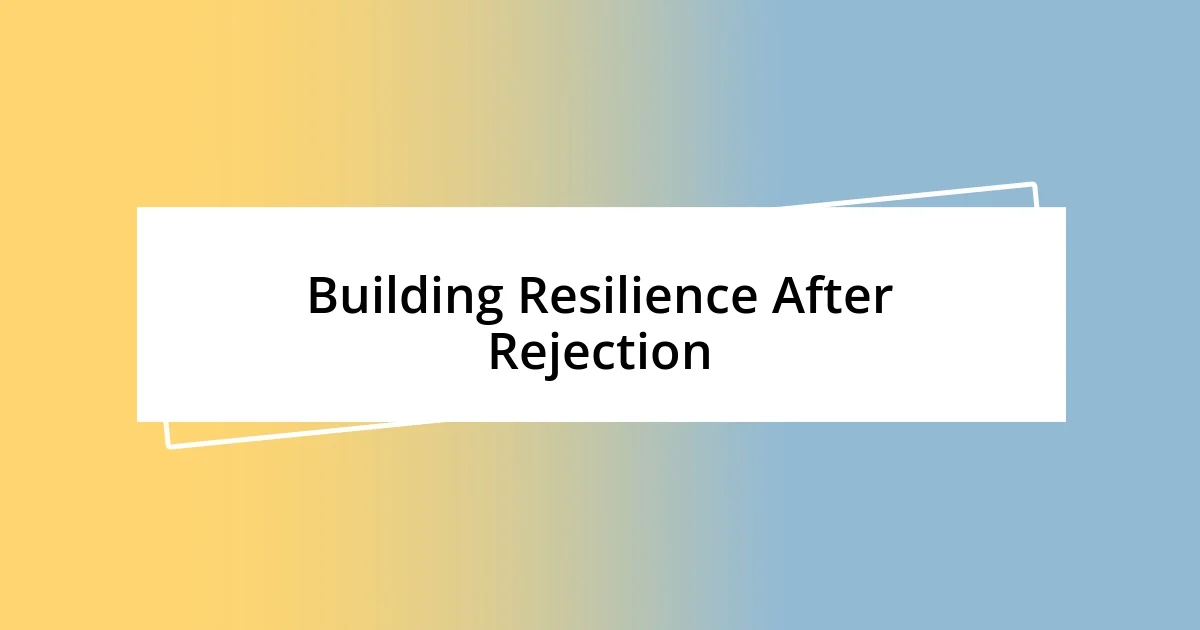
Building Resilience After Rejection
It took me a while to grasp the concept of resilience, especially after facing repeated rejections. I remember a time when I submitted my work to a prestigious publication, only to receive a polite but firm “no.” At first, the impact felt like a punch in the gut, but then I started to view it as a part of my journey. I began asking myself, “What does this mean for me moving forward?” It was through this questioning that I discovered a deeper sense of determination to improve.
Emotional resilience often comes from learning to embrace discomfort. I recall one particular moment after receiving a rejection; I sat down and allowed myself to feel the disappointment fully. I let the wave wash over me and then asked, “How can I turn this feeling into fuel?” This process of acknowledging and expressing my emotions was liberating. Instead of suppressing my feelings, I recognized them as a natural part of growth. Isn’t it fascinating how our most profound lessons often come from our lowest points?
Ultimately, building resilience is about finding strength within ourselves. I started practicing mindfulness techniques, which helped me stay grounded and present. When those rejection letters showed up, I took a deep breath and reminded myself that each setback was merely a redirection. The more I embraced this mindset, the more I realized that rejection doesn’t define my worth. It simply adds chapters to my story that make the successes even sweeter. Doesn’t that shift in perspective amplify our capacity to rise again?
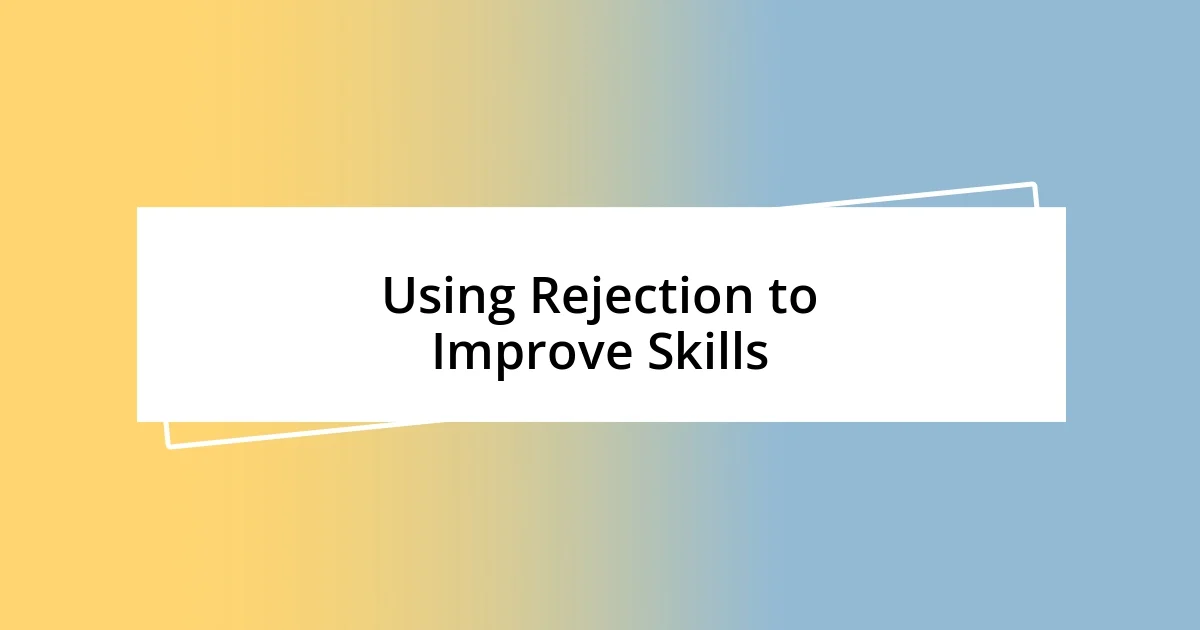
Using Rejection to Improve Skills
Using rejection as a catalyst for self-improvement can be transformative. I once received a rejection letter after a job interview that I had pinned my hopes on. Initially, I felt defeated, but then I decided to request feedback from the interviewer. Their insights highlighted areas I could enhance, and it felt like turning a stumbling block into a stepping stone. Have you ever sought feedback after a setback? It can be enlightening.
As I embraced rejection, I noticed my skills sharpened in unexpected ways. After a string of rejections in my writing career, I took a creative writing course. The constructive criticism I received opened my eyes to techniques and styles I had never considered before. It felt like a lightbulb moment—each critique wasn’t a personal attack but rather a guide to a better me. Isn’t it incredible how outside perspectives can illuminate our blind spots?
Moreover, rejection taught me the importance of adaptability. I recall when a project I was passionate about was turned down by various platforms. Rather than giving up, I pivoted my approach, experimenting with different formats and audiences. This adaptability not only refined my skills but also broadened my creative horizons. Looking back, I realize that each rejection nudged me to think differently. How often do we get stuck in our own ways, unaware of the possibilities that lie beyond our initial plans?








